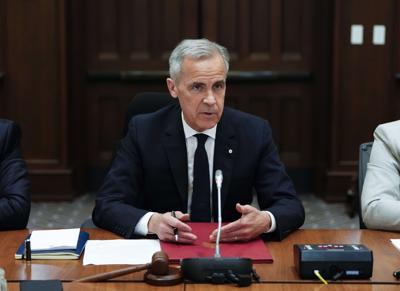OTTAWA — Prime Minister Mark Carney is placing a heavy emphasis on cracking down on crime after some Liberals say the issue cost them GTA seats to the Conservatives in last month’s election.
Carney has named tackling crime as a top priority, as his Liberal government is expected to continue pushing a strict gun-control agenda while increasing investments in border security.
And in a shift from Trudeau government policies that were frequently attacked by Pierre Poilievre’s Conservatives, Carney is also eyeing reforms to the bail system and the Criminal Code.
It’s an acknowledgment that crime was top of mind for many voters during an election campaign where the Conservatives made gains in the GTA at the Liberals’ expense, snatching seven seats that could have provided Carney the pathway to a majority government, including cabinet minister Kamal Khera’s Brampton West riding.Â
A senior Liberal source, who spoke about campaign details on condition they weren’t named, told the Star after the election that crime was a primary issue in some parts of the GTA, which was why the Carney campaign emphasized it in its platform.
“It was a big one, and that’s why it’s a stand-alone issue that we’re tackling,” said Ruby Sahota, the newly appointed secretary of state on combating crime, who was narrowly re-elected in her Brampton North—Caledon riding.
Gary Anandasangaree, the new public safety minister, told the Star Wednesday that Canadians need to not just be safe “but also feel safe.”Â
“That’s one of the reasons why it’s top of mind for us,” he said.
With the GTA as the backdrop, the Liberals proposed several criminal justice reforms during the campaign as they duelled with the Conservatives over which party could best tackle the issue.
Carney has promised to quickly implement the Trudeau government’s promise to buy back “assault-style” and semi-automatic weapons that were banned in 2020, a key but contentious element of the previous government’s gun-control agenda.
He’s also said he would give the RCMP, rather than manufacturers, the authority to classify new firearms entering the market, and has promised measures to restrict gun ownership for convicted criminals and people flagged by police.
And in an echo of previous Poilievre demands, Carney committed to train 2,000 new Canada Border Services Agency and RCMP officers to clamp down at the border on human trafficking and the smuggling of illegal firearms and drugs.
It was on bail reform where Carney’s election platform diverged the most from the Trudeau government’s policies on law enforcement. Former justice minister Arif Virani told the Star in an interview in December the government should not make changes to the bail system until provinces provide data to prove that federal laws — not underfunding of courts or jails — are affecting who gets bail.
Carney is promising several changes to the Criminal Code, including making it harder for people convicted of violent car thefts, human trafficking and home invasions to get bail; allowing tougher sentences for repeat offenders involved in criminal organizations; and increasing penalties for sexual violence, exploitation of children, intimate partner violence and hate crimes. He has also vowed to criminalize the non-consensual distribution of fake sexual images, and the intimidation of people attending places of worship, schools and community centres.
Justice Minister Sean Fraser suggested Wednesday the Carney government wasn’t looking to repeal contentious Trudeau-era bail reforms that were attacked by Poilievre’s Conservatives and the Ford government in Ontario, even as the Liberals acknowledge they “have work to do on crime.”
“I find it very weird, frankly, that the Conservatives would be championing the repeal of legislation that actually strengthened the bail system,” Fraser said. ” I think it would be helpful if they’ve actually read the legislation, considered its impact, before they start suggesting measures that actually achieve the outcome that they say they want, despite the fact that they voted against them.”
It remains unclear how quickly any changes to the Criminal Code might be made, as the government signalled Wednesday that its first priority would be a middle-class tax cut this spring. Finance Minister François-Philippe Champagne said there were no plans to release a budget before this fall’s fiscal update.
Error! Sorry, there was an error processing your request.
There was a problem with the recaptcha. Please try again.
You may unsubscribe at any time. By signing up, you agree to our and . This site is protected by reCAPTCHA and the Google and apply.
Want more of the latest from us? Sign up for more at our newsletter page.

































To join the conversation set a first and last name in your user profile.
Sign in or register for free to join the Conversation